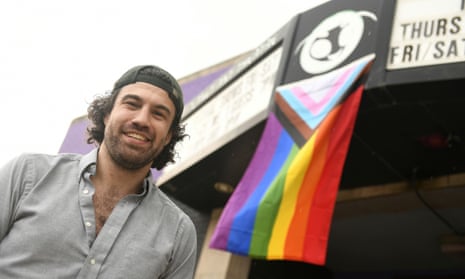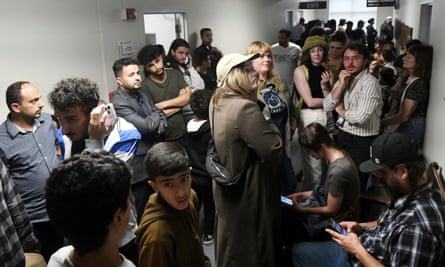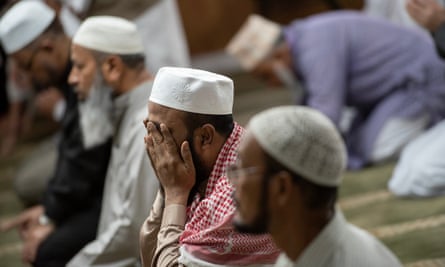‘A sense of betrayal’: liberal dismay as Muslim-led US city bans Pride flags
"Many liberals celebrated when Hamtramck, Michigan, elected a Muslim-majority council in 2015 but a vote to exclude LGBTQ+ flags from city property has soured relations

In 2015, many liberal residents in Hamtramck, Michigan, celebrated as their city attracted international attention for becoming the first in the United States to elect a Muslim-majority city council.
They viewed the power shift and diversity as a symbolic but meaningful rebuke of the Islamophobic rhetoric that was a central theme of then Republican presidential candidate Donald Trump’s campaign.
This week many of those same residents watched in dismay as a now fully Muslim and socially conservative city council passed legislation banning Pride flags from being flown on city property that had – like many others being flown around the country – been intended to celebrate the LGBTQ+ community.
Muslim residents packing city hall erupted in cheers after the council’s unanimous vote, and on Hamtramck’s social media pages, the taunting has been relentless: “Fagless City”, read one post, emphasized with emojis of a bicep flexing.
In a tense monologue before the vote, Councilmember Mohammed Hassan shouted his justification at LGBTQ+ supporters: “I’m working for the people, what the majority of the people like.”
While Hamtramck is still viewed as a bastion of multiculturalism, the difficulties of local governance and living among neighbors with different cultural values quickly set in following the 2015 election. Some leaders and residents are now bitter political enemies engaged in a series of often vicious battles over the city’s direction, and the Pride flag controversy represents a crescendo in tension.
“There’s a sense of betrayal,” said the former Hamtramck mayor Karen Majewski, who is Polish American. “We supported you when you were threatened, and now our rights are threatened, and you’re the one doing the threatening.”
For about a century, Polish and Ukrainian Catholics dominated politics in Hamtramck, a city of 28,000 surrounded by Detroit. By 2013, largely Muslim Bangladeshi and Yemeni immigrants supplanted the white eastern Europeans, though the city remains home to significant populations of those groups, as well as African Americans, whites and Bosnian and Albanian Americans. According to the 2020 census some 30% to 38% of Hamtramck’s residents are of Yemeni descent, and 24% are of Asian descent, largely Bangladeshi.
After several years of diversity on the council, some see irony in an all-male, Muslim elected government that does not reflect the city’s makeup.
The resolution, which also prohibits the display of flags with ethnic, racist and political views, comes at a time when LGBTQ+ rights are under assault worldwide, and other US cities have passed similar bans, with the vast majority driven by often white politically conservative Americans.

While the situation in Hamtramck largely evolved on its own local dynamics, some outside rightwing agitators connected to national Republican groups have been pushing for the ban on Hamtramck’s social media pages and voiced support for it at Tuesday’s meeting. They are from nearby Dearborn where they were part of an effort last year to ban books with LGBTQ+ themes.
Their talking points mirror those made elsewhere: some Hamtramck Muslims say they simply want to protect children, and gay people should “keep it in their home”.
But that sentiment is “an erasure of the queer community and an attempt to shove queer people back in the closet”, said Gracie Cadieux, a queer Hamtramck resident who is part of the Anti-Transphobic Action group.
Mayor Amer Ghalib, 43, who was elected in 2021 with 67% of the vote to become the nation’s first Yemeni American mayor, told the Guardian on Thursday he tries to govern fairly for everyone, but said LGBTQ+ supporters had stoked tension by “forcing their agendas on others”.
“There is an overreaction to the situation, and some people are not willing to accept the fact that they lost,” he said, referring to Majewski and recent elections that resulted in full control of the council by Muslim politicians.
Though the city’s Muslims are not a monolith and some privately told the Guardian they were “frustrated” with council, the only leader to publicly question it was the former city council member Amanda Jaczkowski, a Polish American who converted to Islam.
In a statement, she raised concerns about the move’s legality: “There are far too many questions to pass this today with any semblance of responsibility.”
On one level, the discord that has flared between Muslim and non-Muslim populations in recent years has its root in a culture clash that is unique to a partly liberal small US city now under conservative Muslim leadership, residents say. Last year, the council approved an ordinance allowing backyard animal sacrifices, shocking some non-Muslim residents even though animal sacrifice is protected under the first amendment in the US as a form of religious expression.

When Michigan legalized marijuana, it gave municipalities a late 2020 deadline to enact a prohibition of dispensaries. Hamtramck council missed the deadline and a dispensary opened, drawing outrage from conservative Muslims who demanded city leadership shut it down. That ignited counterprotests from many liberal residents, and the council only relented when it became clear it had no legal recourse.
At other times, the issues are not unique to Hamtramck. In the realm of local politics, personal fights among neighbors, warring factions and dirty politics are a common part of the democratic process across the US.
“I don’t know that we’re really all that different from other cities in most ways,” Majewski said.
However, race and religion add more fraught layers to Hamtramck’s issues. Islamophobia exists here, and some Muslims say they saw bigotry in local voter fraud investigations, and in LGBTQ+ supporters not respecting their religion.
But Majewski said the majority is now disrespecting the minority. She noted that a white, Christian-majority city council in 2005 created an ordinance to allow the Muslim call to prayer to be broadcast from the city’s mosques five times daily. It did so over objections of white city residents, and Majewski said she didn’t see the same reciprocity with roles reversed.

Ghalib disagreed, and labeled the prayer broadcast a “first amendment issue” while noting no one was asking for city hall to broadcast the calls.
Moreover, the white majority council was not always hospitable to Muslim residents who have previously faced overt racism. And with a majority-Muslim council in place, more Muslims had been appointed to boards and commissions, and hired in city hall. So had some LGBTQ+ residents, Ghalib added.
Despite the political clashes, he thinks there is hope for Hamtramck to live up to its multicultural ideals.
“We can get along and people are not violent here,” he said.
Cadieux agreed peaceful coexistence was possible.
“We aren’t in the business of excluding people from our society and I’m not going to exclude socially conservative Muslims – they have a place at the table just like everyone else,” she said. “However, they cannot, and will not, shove another community out of the way.”
No comments:
Post a Comment